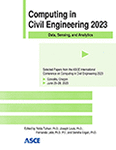A Swarm Intelligence Approach for Statistical Modeling of Wind Speed and Direction: A Case Study of New York Bight
Publication: Computing in Civil Engineering 2023
ABSTRACT
We present statistical modeling of wind speed and direction in the New York Bight region using a Weibull distribution for wind speed and a mixture of von Mises distributions for wind direction. The historic wind data for the years 2019−2021 with a 6-min sampling frequency are divided into two half-yearly intervals based on wind power, representing different seasonal behaviors. The parameters of von Mises distributions are estimated using four different metaheuristic optimization algorithms. The suitability of the distributions is judged based on the Pearson correlation coefficient, which indicates good fits for the proposed models. The results demonstrate the flexibility of the proposed models in representing the probability density function of wind direction regimes in zones with several modes or prevailing wind directions. This research provides valuable insights into the evaluation process of wind energy resources of the New York/New Jersey Bight region, including wind farm layout optimization.
Get full access to this article
View all available purchase options and get full access to this chapter.
REFERENCES
Breckling, J. (2012). The analysis of directional time series: applications to wind speed and direction, Vol. 61. Springer Science & Business Media.
Bureau of Ocean Energy Management. “New york bight”, <https://www.boem.gov/renewable-energy/state-activities/new-york-bight>. Accessed: March 11, 2023.
Carta, J. A., Bueno, C., and Ramírez, P. (2008a). “Statistical modelling of directional wind speeds using mixtures of von mises distributions: Case study.” Energy conversion and management, 49(5), 897–907.
Carta, J. A., Ramirez, P., and Bueno, C. (2008b). “A joint probability density function of wind speed and direction for wind energy analysis.” Energy Conversion and Management, 49(6), 1309–1320.
Carta, J. A., Ramirez, P., and Velazquez, S. (2009). “A review of wind speed probability distributions used in wind energy analysis: Case studies in the canary islands.” Renewable and sustainable energy reviews, 13(5), 933–955.
Dolores Esteban, M., Javier Diez, J., Lopez, J. S., and Negro, V. (2011). “Why offshore wind energy?.” Renewable Energy, 36(2), 444–450.
Erdem, E., and Shi, J. (2011). “Comparison of bivariate distribution construction approaches for analysing wind speed and direction data.” Wind Energy, 14(1), 27–41.
Faris, H., Aljarah, I., Al-Betar, M. A., and Mirjalili, S. (2018). “Grey wolf optimizer: a review of recent variants and applications.” Neural computing and applications, 30, 413–435.
Feng, J., and Shen, W. Z. (2015). “Solving the wind farm layout optimization problem using random search algorithm.” Renewable Energy, 78, 182–192.
Gharehchopogh, F. S., and Gholizadeh, H. (2019). “A comprehensive survey: Whale optimization algorithm and its applications.” Swarm and Evolutionary Computation, 48, 1–24.
Head, J. D., and Zerner, M. C. (1985). “A broyden—fletcher—goldfarb—shanno optimization procedure for molecular geometries.” Chemical physics letters, 122(3), 264–270.
Mardia, K. V., Jupp, P. E., and Mardia, K. (2000). Directional statistics, Vol. 2. Wiley Online Library.
Masseran, N., Razali, A. M., Ibrahim, K., and Latif, M. T. (2013). “Fitting a mixture of von mises distributions in order to model data on wind direction in peninsular malaysia.” Energy Conversion and Management, 72, 94–102.
Mirjalili, S. (2015). “Moth-flame optimization algorithm: A novel nature-inspired heuristic paradigm.” Knowledgebased systems, 89, 228–249.
Mirjalili, S., and Lewis, A. (2016). “The whale optimization algorithm.” Advances in engineering software, 95, 51–67.
Mirjalili, S., Mirjalili, S. M., and Hatamlou, A. (2016). “Multi-verse optimizer: a nature-inspired algorithm for global optimization.” Neural Computing and Applications, 27, 495–513.
Mirjalili, S., Mirjalili, S. M., and Lewis, A. (2014). “Grey wolf optimizer.” Advances in engineering software, 69, 46–61.
NOAA Tides and Currents. “Station home page”, <https://tidesandcurrents.noaa.gov/stationhome.html?id=8531680>. Accessed: March 11, 2023.
Rad, N. N., Bekker, A., and Arashi, M. (2022). “Enhancing wind direction prediction of south africa wind energy hotspots with bayesian mixture modeling.” Scientific Reports, 12(1), 11442.
Raju, K., Madurai Elavarasan, R., and Mihet-Popa, L. (2020). “An assessment of onshore and offshore wind energy potential in india using moth flame optimization.” Energies, 13(12), 3063.
Shi, H., Dong, Z., Xiao, N., and Huang, Q. (2021). “Wind speed distributions used in wind energy assessment: a review.” Frontiers in Energy Research, 790.
US Energy Information Administration. “U.S. energy facts”, <https://www.eia.gov/energyexplained/us-energy-facts>. Accessed: March 11, 2023.
Wadi, M., Elmasry, W., Shobole, A., Tur, M. R., Bayindir, R., and Shahinzadeh, H. (2021). “Wind energy potential approximation with various metaheuristic optimization techniques deployment.” 2021 7th International Conference on Signal Processing and Intelligent Systems (ICSPIS), IEEE, 1–6.
Wang, X., Zhao, H., Han, T., Zhou, H., and Li, C. (2019). “A grey wolf optimizer using gaussian estimation of distribution and its application in the multi-uav multi-target urban tracking problem.” Applied Soft Computing, 78, 240–260.
Wu, Q., Bessac, J., Huang, W., Wang, J., and Kotamarthi, R. (2022). “A conditional approach for joint estimation of <? xmltex\break?>wind speed and direction under future climates.” Advances in Statistical Climatology, Meteorology and Oceanography, 8(2), 205–224.
Xue, C., Zhang, T., and Xiao, D. (2022). “An advanced broyden–fletcher–goldfarb–shanno algorithm for prediction and output-related fault monitoring in case of outliers.” Journal of Chemistry, 2022.
Ye, X., Xi, P., and Nagode, M. (2019). “Extension of rebmix algorithm to von mises parametric family for modeling joint distribution of wind speed and direction.” Engineering Structures, 183, 1134–1145.
Information & Authors
Information
Published In
History
Published online: Jan 25, 2024
ASCE Technical Topics:
- Case studies
- Climates
- Energy engineering
- Energy sources (by type)
- Engineering fundamentals
- Environmental engineering
- Infrastructure
- Intelligent transportation systems
- Materials characterization
- Materials engineering
- Mathematics
- Methodology (by type)
- Mixtures
- Renewable energy
- Research methods (by type)
- Seasonal variations
- Statistics
- Structural engineering
- Transportation engineering
- Transportation management
- Wind direction
- Wind engineering
- Wind power
- Wind speed
Authors
Metrics & Citations
Metrics
Citations
Download citation
If you have the appropriate software installed, you can download article citation data to the citation manager of your choice. Simply select your manager software from the list below and click Download.
